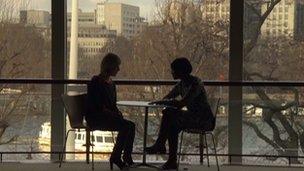Jude Kelly: Arts are a necessity, not a luxury
- Published
Artistic director Jude Kelly said more funding was needed for the arts
More funding should be put into the arts not less, says the artistic director of Europe's largest arts complex, London's Southbank Centre.
Jude Kelly said the government had not shown "any clear commitment" to the arts and was confused over how to prioritise it.
She said: "The arts have got to be embedded like the NHS and education."
The government department responsible said protecting arts funding was "simply not an option".
Ms Kelly also called on large arts organisations to help smaller ones during the recession.
"I wouldn't single this government out as having any clear commitment to the arts at all.
Tourism and export
"I think it's in that space that a lot of politicians find themselves in which is they recognise it's a good thing (the arts), but they don't know where to place it in terms of social policy.
"This country is famous for the creative industries, we get huge amounts of tourism and export because of that," she said.
In the 2012-2013 financial year the Arts Council slashed its funding of theatres, galleries and other cultural organisations by £40m and local councils have had to make cuts in their funding of local arts.
Ms Kelly said local authority cuts were the most damaging because when trying to deal with so many different kinds of services councils found it hard to make an argument for anything that could be remotely considered a "welcome extra".
"We're always saying the arts aren't a luxury, they're a necessity. Local authorities can't win those arguments sometimes, even to themselves," she said.
But a spokesman for the Department for Culture, Media and Sport (DCMS) said: "Protecting arts funding while cutting public spending in other areas is simply not an option.
"While there may be some who argue that arts and culture should be exempt from cuts altogether, this simply will not wash with members of the public who are aware of the need for public spending reductions across the public sector.
"Over the life of this Parliament, the government is investing £2.9bn in the arts. We have also reformed the National Lottery, increasing the share to the arts.
The department said the the Arts Council's overall budget in 2015 would be reduced by 8% in real terms, compared with 2010.
The Arts Council disputes this figure, with a spokesman saying the reduction stood at 12%, factoring in both government funding and lottery income, before the additional cuts in the Autumn statement.
'London is exceptional'
Ms Kelly also urged larger arts organisations to help out smaller institutions facing hardship in the recession.

The Southbank Centre attracts three million visitors a year
She said: "We can never divorce the big from the small. It's going to be more demanding on the bigger institutions to demonstrate that they are going to hold those bonds tightly and support them. They've got to.
"So, the advice we are giving ourselves is that we've got to be powerfully asserting the importance of the arts in the capital.
"It's what makes London exceptional. We're probably more important than New York, Paris or any other place in terms of the creative and cultural industries.
"The only way to safeguard that is for places like us to embrace what's happening with smaller and medium organisations and say 'we're all in this together'."
The Southbank Centre, which attracts three million visitors a year, sits on a 21-acre site beside the Thames.
Update 3 January 2013: This story was amended after the Department for Culture, Media and Sport corrected its statement regarding the reduction to the Arts Council's overall budget in 2015 to make clear the overall reduction would be 8% rather than 5%.
- Published3 January 2013
- Published29 December 2012
- Published10 December 2012